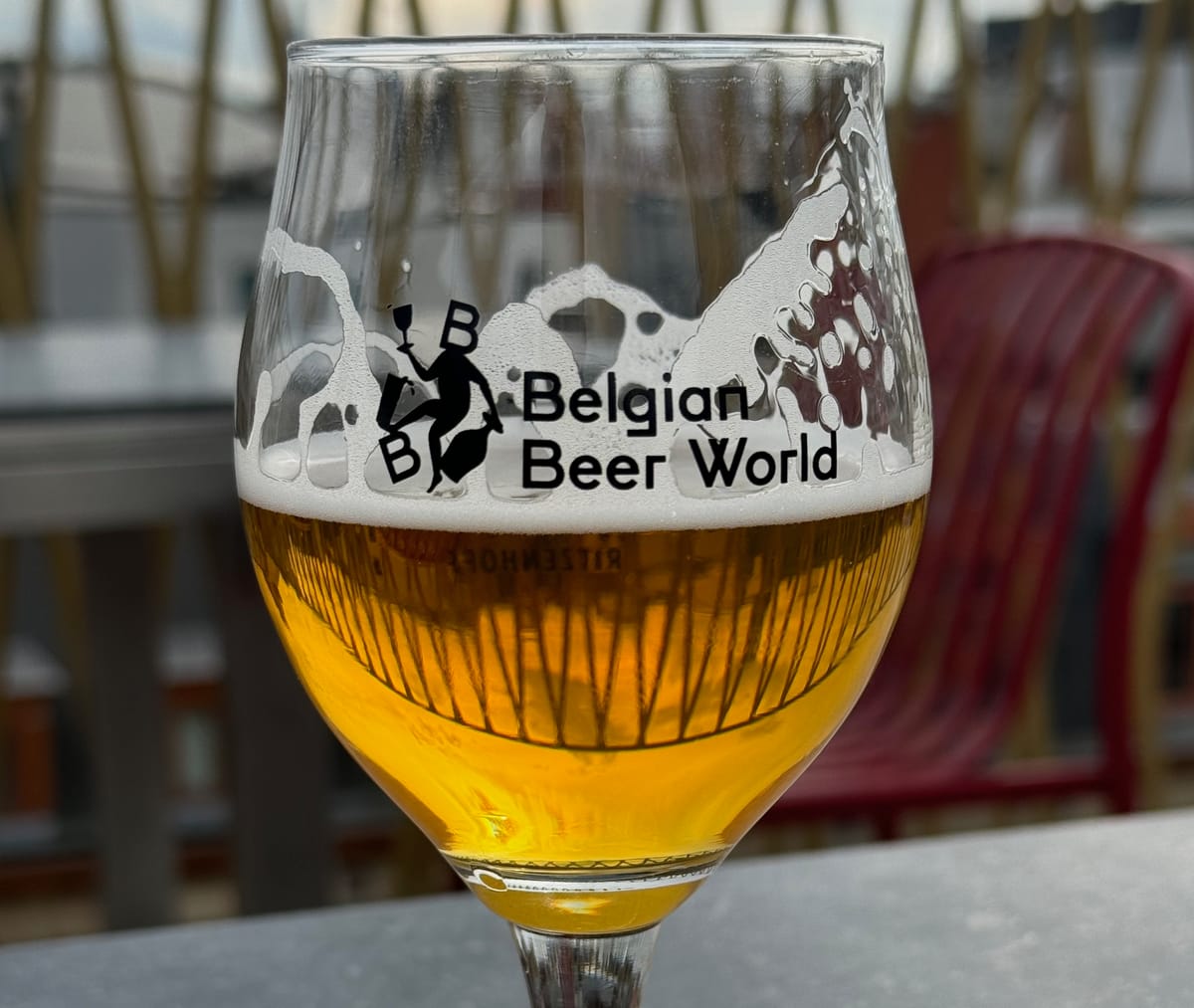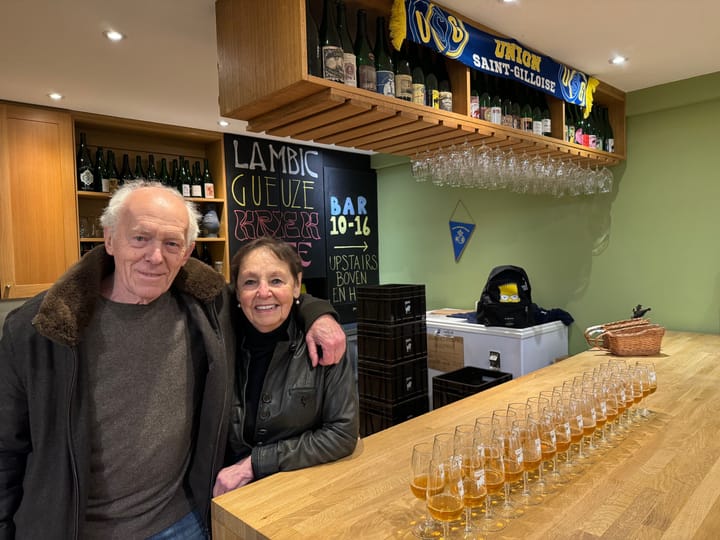How Liberal politician Sven Gatz used taxpayer money to build his Brussels beer temple
Sven Gatz had a vision: to create a beer museum in Brussels that could rival those in cities like Dublin and Amsterdam. But the costs of the project spiralled out of control and taxpayers ended up footing the bill.

By Michiel van Hulten, Marc Brion, and Katlijne Van hunsel
In 2011, the Vlerick Business School had ambitious plans. The Flemish higher education institution wanted to open a campus and financial centre in the old Brussels Stock Exchange building. The monumental building in the heart of Brussels had been empty for several years. Vlerick had already signed an agreement with tenant NYSE Euronext, which in 1994 signed a 100-year leasehold agreement with the City of Brussels. According to Dean Philippe Haspeslagh, the Stock Exchange was the perfect location for his institution.
But Brussels Mayor Freddy Thielemans (PS) had other plans. In April 2011, he abruptly scrapped the proposal. The city repurchased the leasehold from Euronext for €47 million. Thielemans envisioned a different future for the building, though he couldn’t say what it was yet. In February 2012, the city confirmed to De Standaard that it was studying various reuses for the building, including a beer museum.
Guinness Storehouse
The idea for Belgian Beer World was conceived in late 2006 when Open Vld politician Sven Gatz, then a Flemish MP and now Brussels Minister of Finance and Budget, took a city break to Dublin. Gatz explained: “In Dublin, the main attraction turned out to be the Guinness Storehouse, an old warehouse completely stripped to resemble a pint glass. It was part experience, part museum. The Storehouse attracts 15 million visitors every year. As an ambitious city marketeer, I thought: Why can't we do this in Brussels?”
Over the next few years, Gatz developed his plans further. He founded the non-profit organisation Brussels Beer Capital of the World, with the goal of promoting Belgian and Brussels beers and breweries. Together with then Brussels Minister of Finance and Budget Jean-Luc Vanraes, Gatz started searching for a possible location for the future beer museum. He soon turned to Brussels Alderman for Tourism Philippe Close (PS), who supported the project and promised to find a suitable site.
It was no coincidence that Gatz ended up working with Close. Both politicians are known for their fondness for Belgian beer culture. Gatz founded the Belgian Beer Club in 2010 at the request of AB InBev. According to him, the club, which consisted of about 100 Flemish, Walloon, and Brussels politicians, championed the interests of the beer sector. Meanwhile, Close made the deep cellars of Brussels’ Hooikaai available as storage space for Brussels brewers in 2011.
After Gatz announced his departure from politics in 2011 to become the director of the Belgian Brewers’ Union, the predecessor of the Belgian Brewers Federation, Close contacted him again. Gatz recalled: “He had good news. He said: we’ve repurchased the Stock Exchange. That’s where we’re going to do it.” According to Gatz, the City of Brussels didn’t like the idea of a major Flemish educational institution occupying the Stock Exchange. “There was a community angle to it.”
€15 million
When Gatz took over as director of the brewers' federation in September 2011, he first had to convince its members about the Stock Exchange project. “The brewers were eyeing each other. Eventually, AB InBev, as the largest brewer, had to give the go-ahead. There was still one Belgian in the executive committee, who also happened to be the marketing director. I had an hour to convince him, which I did. Then we got the others on board. In the end, we had thirty breweries on board.” The brewers eventually invested €6 million in the project, which at that time was estimated to cost €15 million.
Consultant Krishan Maudgal, former marketing manager at Affligem and export director at Heineken and Alken-Maes, was asked by the brewers to conduct a feasibility study. The study calculated a potential of 400,000 visitors per year, which would make the beer museum one of the top five tourist attractions in Brussels. Maudgal would later become the director of the brewers' federation in 2021.
In June 2013, the Brussels City Council approved the future beer temple, with the opening scheduled for 2018. The management was to be a public-private partnership between the City of Brussels and the brewers. However, little was known about the museum's content and the associated price tag. The costs had already exceeded the initial estimate of €15 million. When the Brussels City Council approved the project in May 2014, the costs had risen to over €30 million.
At the end of 2013, the non-legal entity Belgian Beer Experience was established to support the Stock Exchange project, based at the Belgian Brewers Federation. The largest brewers, including AB InBev, Duvel Moortgat, and Alken-Maes, were involved. According to the brewers' federation, 95% of Belgian breweries supported the project. However, of the 417 breweries in Belgium by the end of 2023, only 104 participated—just a quarter, with most contributing a symbolic €1,500.
The planned location of a beer museum in the Stock Exchange didn’t sit well with everyone in Brussels. The loudest opposition came from cultural philosopher and activist Lieven De Cauter, who railed against what he called “the amusement parkification of Brussels.” "A beer temple only contributes to making a caricature of ourselves. Belgium: beer, fries, and chocolate. That nothing better could be devised for the Stock Exchange is extremely painful. Return Brussels' centre to its residents. The Stock Exchange belongs to everyone. The steps should again become a symbol of our democracy in action. The beer temple? Over our dead bodies!" De Cauter fumed in BRUZZ.
Meanwhile, Philippe Close—now Brussels mayor—was knighted by the Brewers’ Guild, as Sven Gatz had been earlier. According to the brewers, “Knights are people who have rendered outstanding service to Belgian beer.” Upon their initiation, they pledge to serve the interests of brewers.
Other prominent politicians, such as Alexander De Croo and Didier Reynders (Open Vld), Hilde Crevits, Joke Schauvliege, and Vincent Van Peteghem (cd&v), Ben Weyts (N-VA), and Melissa Depraetere (Vooruit) were also knighted. Through this, the beer lobby has penetrated the highest echelons of Belgian politics.
High Health Council
While no direct link between the beer sector’s charm offensive and political decision-making has ever been proven, it is a fact that proposals by the High Health Council to tighten restrictions on the marketing and availability of alcoholic beverages, such as banning beer and wine sales to minors, have failed to pass in the past decade. At the same time, the federal, Flemish, and Brussels governments have invested tens of millions of euros in beer-related projects, including Belgian Beer World.
In late 2018, the Brussels Region granted a building permit for the Stock Exchange project, but city associations Atelier de Recherche et Action Urbaines (ARAU) and Inter-Environnement Bruxelles (IEB) filed an appeal with the Council of State. They argued that the project primarily served the brewers' commercial interests and was developed without public consultation. They also opposed any interference with the building's protected status.
In June 2020, the City of Brussels announced the creation of the Autonomous Municipal Company (AGB) Beurs. This public-private partnership with the brewers' company Belgian Beer Experience took over the operation of the Stock Exchange building. Thanks to the AGB structure, the city could reclaim the VAT it paid for the works. The city guaranteed coverage for any losses.
According to Brussels city councillor Bertin Mampaka (formerly cdH, now MR), the city risks becoming “the goose that lays the golden eggs” with this arrangement. Fellow councillor Geoffroy Coomans de Brachène (MR) also raised concerns: “The construction hasn’t even started, but the costs have already spiralled out of control. From €15 million to €20 million, then €25 million. According to the latest budget, we’re now at €45 million. And that doesn’t even include the €5 million for repurchasing the leasehold from Euronext.”
In November 2020, the city announced that the total costs of the project had risen to nearly €50 million. City councillor Mathilde El Bakri (PTB) called the project a “bottomless pit” in the Brussels city council and criticised Close for a lack of public consultation. “You can stand on your head, but don’t try to tell me this is a democratic project that serves the citizens and the public interest,” she said. Coomans de Brachène called it “a completely insane project that is being managed amateurishly.”
Close responded indignantly in the council: “I am very proud that the city has regained control of this building. It’s an extraordinarily ambitious project that costs a lot of money, but sometimes the government has to invest in its own buildings. The people who voted for the list I represented in 2018 knew very well that we would invest in the Stock Exchange project.”
A petty, vinegar-pissing Smurf mentality
Six months later, the costs had risen further to €59 million. Then, an even bigger setback followed. In June 2022, a State Council auditor advised withdrawing the building permit for the project. The planned works were said to violate the Brussels Code of Spatial Planning, which prohibits the demolition of a protected building or part of it. Former Flemish Master Builder Leo Van Broeck called the Council of State's advice “a disgracefully backward, nostalgic attitude and a petty, vinegar-pissing Smurf mentality.”
Ultimately, Brussels State Secretary for Urban Planning and Heritage Pascal Smet (Vooruit) issued a new building permit, arguing that the changes to the building were better justified in the new version. “The rich history and vibrant future of our city can and must go hand in hand. We’ve better explained the original building permit and demonstrated that this beautiful restoration project can only be fully appreciated if it is accessible to everyone,” Smet said in a statement.
Meanwhile, tensions in the Brussels city council continued to rise. In response to questions from David Weytsman (MR), the council in January 2023 was, for the first time, fully briefed on the costs. The total expenses were now estimated at over €83 million, not including the city’s buyback of the leasehold. Weytsman sharply criticised Mayor Close: “The issue isn’t just knowing how much has been invested in the Stock Exchange, but understanding how we went from €42 million to almost €90 million in 24 months!”
Close remained unfazed. “It’s time we stopped taking half measures in Brussels. Yes, we’ve invested a lot of money in this building. You think it’s a waste. We believe the investment in this historic building is justified and enhances Brussels’ heritage.”
In the end, the total costs reached €93 million, excluding the leasehold repurchase. Of this, €87 million came from local, regional, federal, and European subsidies. The brewers' contribution was estimated by the Brussels region to be €56 million, although the brewers themselves claimed it was only €6 million.
Sven Gatz, who as Brussels Minister granted €12 million in subsidies to the project he himself had initiated, admitted that the brewers got off lightly. “I don’t want to give Philippe Close any ideas, but if I owned the building, I would ask the brewers to contribute more. Their contribution could have increased.”
Mayor Close declined to comment on our requests. However, the brewers disagreed with Gatz. Krishan Maudgal told us: “Only the renovation costs of the building have risen over the years, not those of the beer route. Why should the breweries invest in the renovation of a building that doesn’t belong to them?”
A good investment
Gatz brushed off criticism of the project's skyrocketing costs. “Making a tight budget is typical of Belgium. Otherwise, you might never start. On the other hand, if you consider the €90 million it has now cost: twenty years ago, the Guinness Storehouse already cost €80 million. So, for me, it remains a good investment.”
Isabelle Pauthier, a former Brussels MP for Ecolo and then director of city association ARAU, saw it differently. She told us: “Belgian Beer World is a private initiative, but the government paid the vast majority of the costs. European subsidies intended for supporting SMEs were used to fund a project that mainly benefits AB InBev.” AB InBev did not respond to our questions.
On Saturday, 9 September 2023, Belgian Beer World finally opened its doors, years later than planned. Sven Gatz declared himself “a happy man” on LinkedIn. However, the first reviews were scathing. “The setup is strikingly clinical and slick. Eyes and ears are engaged, but the sense of smell is never stimulated. Anyone who has visited a brewery knows that the smells linger the longest. I also miss the tactile experience of the liquids in copper kettles, the wooden barrels, the steaming hot pipes. Brewing beer never comes to life,” Jan Dehaese lamented in De Standaard. On TripAdvisor, one visitor wrote: “Content-wise, the beer museum has little to offer. The beautiful Stock Exchange building deserved much better.”
Of the 104 participating breweries, the market leaders dominate Belgian Beer World. Of the 43 draft beers available on the impressive rooftop terrace, most come from industrial brewers like AB Inbev, Duvel Moortgat, and Heineken. Ironically, Brussels breweries are entirely absent.
According to Krishan Maudgal of the brewers' federation, they chose this themselves, and it doesn’t matter considering Belgian Beer World’s international focus: “Visitors from the other side of the Atlantic don’t care about the community divide we always get caught up in in Belgium. The brand with an international reputation is ‘Belgian beer’, not Brussels, Flemish, or Walloon beer.”
Cantillon Brewery from Anderlecht is one of the Brussels breweries that did not join. According to owner Jean-Pierre Van Roy, who also founded the Brussels Gueuze Museum, Belgian Beer World mainly serves the interests of the large breweries. When us spoke to him, he was still angry about it: “It’s really a disgrace! We’re giving millions to billionaires, for God’s sake. Because AB InBev isn’t rich enough! (Laughs.) How is this possible?” Other Brussels breweries, such as Brasserie de la Senne and Brussels Beer Project, did agree to participate, but they remain nearly invisible in the building.
Still a long way to go
More than six months after opening, Belgian Beer World is struggling with disappointing visitor numbers. Instead of the hoped-for 1,000 visitors per day, the count stands at just 300, with visitors willing to pay €17 for a ticket. That amounts to about 100,000 per year, far fewer than the 400,000 projected in the feasibility study. Due to the low visitor numbers, the museum has already abandoned its seven-day-a-week opening schedule. It is now closed to the public on Mondays. The 2024 budget forecasts a deficit of €11 million.
According to AGB Beurs, it is still too early to draw conclusions: “The intention is to present a complete three-year financial plan after one full year of operation. This cautious approach will allow us to understand the factors influencing growth, identify areas for improvement, and develop strategies for sustainable growth,” the company wrote to the city council.
Since April this year, Dutchman Dirk Lubbers has been the interim director of the Stock Exchange project. Krishan Maudgal of the brewers' federation approached him, Lubbers told us. The former manager of the Heineken Experience in Amsterdam and the Pilsner Urquell Experience in Prague is tasked with increasing the disappointing visitor numbers. Lubbers believes it will take at least a year. “A lot of progress has already been made. Tasting, smelling, and feeling are now central. I want this place to be full. I’m absolutely confident we can make that happen.”
Initiator Sven Gatz acknowledged that there is still a long way to go. “The start has been good, but it needs to get better. With 100,000 visitors, you’re not there. You need 150,000 to 200,000 visitors to break even. By Christmas or next summer at the latest, we’ll have to see if we reach that goal. Otherwise, there’s a problem.”
(A Dutch-language version of this article first appeared in the print and online editions of Knack on 20 July 20204.)



Comments ()